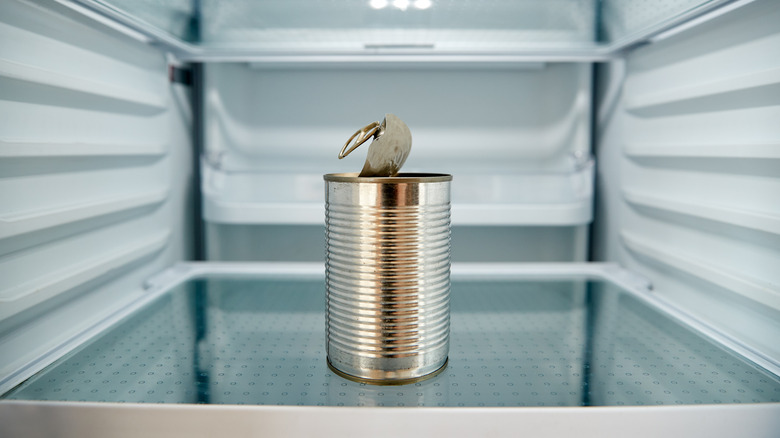Is It Safe To Store Open Canned Food In The Refrigerator?
It's a common kitchen conundrum: You're whipping up a hearty chili or an Italian tomato sauce but find you only need half the can of black beans or just a tablespoon or two of tomato paste for the recipe. Perhaps you've opened a can of pineapple slices for a fruit salad but don't need to use the entire can, or you're making a stir-fry and want to add a few canned corn kernels. So, what should you do with the open can? Is it necessary to transfer the contents to an airtight container, or will plastic wrap or a silicone lid over the can suffice in the refrigerator for a few days? And, if you go the can-storage route, is it safe? It appears that experts seem to agree that storing an open can of food in the refrigerator doesn't present a major health concern. Still, it may not be the best option for your leftovers.
Canned foods typically come in standard-sized containers, and if you're cooking for a smaller number of people or making a recipe that doesn't require the entire can, you'll use only a portion and need to store the rest for later use. Critics say storing an open can of food in the fridge can be problematic for a few reasons, primarily related to food safety and food quality, but the facts don't necessarily back up that argument.
The case against storing open cans of food in the fridge
An oft-repeated reason to avoid sticking an open can in the fridge is that chemicals from the metal can and packaging could seep into the food and contaminate it with Bisphenol-A (BPA). This synthetic compound has hormone-like properties, which can build up in humans and potentially affect metabolism and disease rates.
However, the U.S. Food and Drug Administration maintains that, at currently approved levels, any BPA present in cans or containers is safe. The agency continues to review new data on the subject. "We reassure consumers that current approved uses of BPA in food containers and packaging are safe," the agency reports on its website, adding, "FDA continues to monitor the scientific literature for new research that helps enhance our understanding of BPA, and will consider new data as it continues to ensure the safe use of BPA in food packaging."
There is also the possibility that a particularly acidic food — think stewed tomatoes — could trigger a chemical reaction that breaks down the inside of the can and actually dissolves away some of the metal. However, these foods will typically have a shorter shelf life than their low-acidity counterparts, and that sort of corrosive effect can take years, according to the USDA.
Preserving flavor and taste
Another argument among the anti-can-in-fridge contingent has more to do with the flavor and taste of the food. Storing an open can in the fridge can leave the food inside tasting tinny or "canned," Cornell University food microbiologist Carl Batt told ScienceNotes.org. He added that, without a good seal, the canned item is more likely to dry out or absorb potentially funky odors or flavors from its fridge neighbors.
But the bottom line is best covered by the USDA's Food Safety and Inspection Service, which offers a definitive answer to our original question: "Unused portions of canned food may be refrigerated in the can, but to preserve optimum quality and flavor, place the unused portion in a glass or plastic storage container." If refrigerating a can, the agency encourages consumers to cover it with some sort of lid and to be sure to eat the food within four days.
Of course, there is always the option to transfer canned contents into a glass or plastic container, which provides a better seal against air and contaminants, reducing the risk of spoilage and foodborne illness. Additionally, glass or plastic containers won't react with the food, preserving its flavor and quality.


